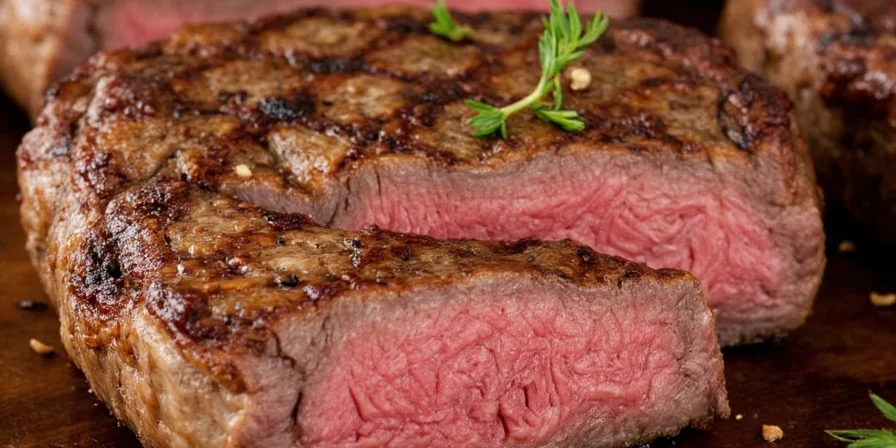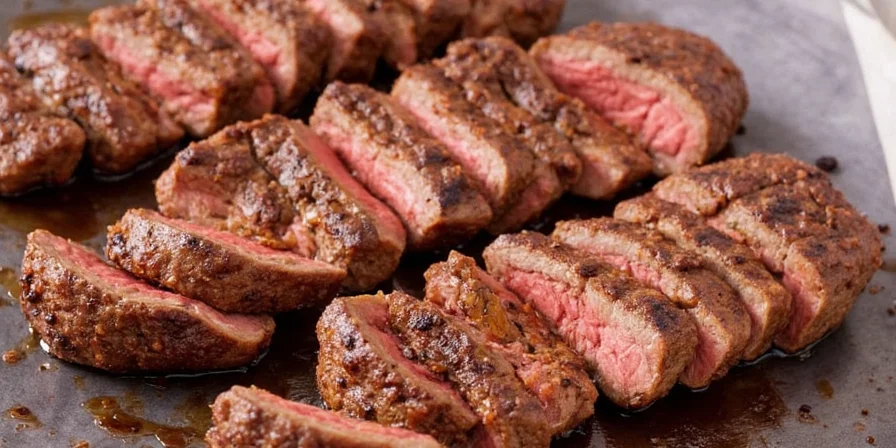Table of Contents
- Quick Guide: Perfect Sirloin Steak in 20 Minutes
- Why Sirloin? The Star of the Show
- Spice Basics: What You Need to Know Before Seasoning
- Ingredients for the Ultimate Sirloin Steak
- Step-by-Step Guide: From Prep to Plate
- Pro Tips: Master the Magic of Marination & Searing
- Spice Comparison Chart: Mild vs. Wild
- Variations: Spice It Up in Style
- Frequently Asked Questions (FAQs)
- Conclusion: Serve with Confidence and a Dash of Swagger
Quick Guide: Perfect Sirloin Steak in 20 Minutes
For perfectly cooked medium-rare sirloin steak: Pat 1-1.5 inch thick steak dry, season with 1 tbsp kosher salt, 1 tsp black pepper, and 1 tsp smoked paprika. Rest at room temperature 30-45 minutes. Preheat cast iron skillet to 400-450°F. Sear 3-4 minutes per side, add butter and aromatics for final 2 minutes. Rest 5-10 minutes before slicing. Target internal temperature: 130-135°F for medium-rare.
Why Sirloin? The Star of the Show
Sirloin delivers the ideal balance of tenderness and flavor without premium pricing. This cut withstands bold seasoning while maintaining its distinctive beefy character, making it perfect for home cooks seeking restaurant-quality results. The methodology below transforms everyday sirloin into impressive meals through precise spice application and temperature control - no professional equipment required.
Spice Basics: What You Need to Know Before Seasoning
Understanding spice behavior elevates your technique beyond basic recipes. While salt and pepper form the foundation, their interaction with meat proteins creates transformative results:
- Salt's dual role: Dissolves muscle proteins to improve moisture retention during cooking
- Pepper varieties: Black pepper's piperine adds sharpness, while white pepper offers earthy depth
- Smoked elements: Compounds like guaiacol in smoked paprika bind with fats for deeper flavor penetration
- Aromatic foundations: Garlic and onion powders provide stable flavor bases that won't burn during high-heat searing
Culinary science reveals universal principles: effective seasoning requires understanding fat-soluble (paprika, cumin) versus water-soluble (salt, pepper) compounds. This ensures balanced flavor development without overwhelming the meat's natural taste.
Ingredients for the Ultimate Sirloin Steak
Simple ingredients, precisely measured for optimal results (serves one):
- 1 boneless sirloin steak (1 to 1.5 inches thick)
- 1 tbsp kosher salt
- 1 tsp freshly ground black pepper
- 1 tsp smoked paprika
- ½ tsp garlic powder
- ½ tsp onion powder
- ½ tsp chili powder (optional)
- 1 tbsp high-smoke-point oil (avocado or grapeseed)
- 1 tbsp butter (for finishing)

Step-by-Step Guide: From Prep to Plate
- Dry thoroughly: Pat steak with paper towels until no moisture transfers (critical for crust development)
- Apply spice blend: Press mixture firmly into all surfaces, including edges
- Rest at room temperature: 30-45 minutes for even cooking
- Preheat cooking surface: Achieve 400-450°F (204-232°C) for optimal sear
- Sear precisely: 3-4 minutes per side for medium-rare (adjust for thickness)
- Finish with aromatics: Add butter, garlic, and rosemary during last 2 minutes
- Rest properly: 5-10 minutes tented with foil before slicing
Pro Tips: Master the Magic of Marination & Searing
- Strategic marinating: For deeper flavor penetration, combine oil-based spices (paprika, cumin) in a 1-hour marinade—avoid acid-heavy mixtures that can toughen lean sirloin
- Temperature control: Pull steak 5°F below target temperature (130°F for medium-rare) as carryover cooking continues during rest
- Crust optimization: Press gently during initial sear contact to maximize surface-area browning without sticking
- Compound butter upgrade: Mix 4 tbsp softened butter with 1 tsp each of minced herbs and citrus zest for finishing
Spice Comparison Chart: Mild vs. Wild
| Spice | Mild Use | Wild Use | Flavor Profile |
|---|---|---|---|
| Black Pepper | 1 tsp | 1.5 tsp + cracked by hand | Earthy, sharp |
| Smoked Paprika | 1 tsp | 1.5 tsp + sprinkle post-sear | Smoky, sweet |
| Garlic Powder | ½ tsp | 1 tsp + minced fresh cloves | Pungent, savory |
| Chili Powder | ¼ tsp | 1 tsp + cayenne boost | Spicy, earthy |
| Cumin | ⅛ tsp | ½ tsp | Warm, nutty |

Variations: Spice It Up in Style
- Global Fusion Twist: Combine 1 tsp sumac with za'atar for Middle Eastern depth, served with mint-yogurt sauce
- Umami Boost: Replace chili powder with ½ tsp mushroom powder for intensified savory notes
- Citrus-Infused: Add lemon or orange zest to spice rub before cooking for bright acidity
- Smokehouse Method: Finish with ¼ tsp liquid smoke in butter for indoor grilling depth
Frequently Asked Questions (FAQs)
How long to cook sirloin steak for medium-rare?
For a 1-1.5 inch thick sirloin steak, sear 3-4 minutes per side at 400-450°F. Target internal temperature is 130-135°F. Remember to pull the steak 5°F below target temperature as carryover cooking continues during resting.
Can I use frozen sirloin steaks?
Thawing is essential for even cooking. Frozen steaks develop uneven textures—waterlogged centers with overcooked exteriors. For best results, refrigerate covered for 24 hours before cooking.
Should I salt the steak ahead of time?
Yes—salting 45 minutes pre-cook allows salt to penetrate ½ inch into the meat. For thicker cuts, 1-2 hours maximizes moisture retention without surface drying.
How do I verify steak doneness without a thermometer?
Use the hand-test method: Press thumb to index finger for rare (soft), middle finger for medium-rare (yielding), ring finger for medium (firm). Practice builds accuracy.
What pan alternatives work without cast iron?
Stainless steel provides excellent sear potential. Preheat thoroughly, then add oil until shimmering. Avoid non-stick surfaces—they can't achieve the 400°F+ needed for proper Maillard reaction.
Conclusion: Serve with Confidence and a Dash of Swagger
This methodology transforms sirloin into a consistently impressive centerpiece by focusing on scientifically-backed techniques accessible to all home cooks. The real magic lies not in exotic ingredients but in understanding how basic elements interact—salt's protein modification, smoke compounds' fat solubility, and precise temperature management.
By mastering these fundamentals, you'll develop intuition for adjusting variables based on your specific equipment and preferences. Whether cooking for two or hosting weekend gatherings, these principles ensure perfectly seasoned, juicy results every time—proving that exceptional steak requires skill, not expensive tools.










 浙公网安备
33010002000092号
浙公网安备
33010002000092号 浙B2-20120091-4
浙B2-20120091-4